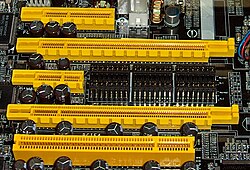
Back مسرى الربط السريع بين المكونات الطرفية Arabic PCI Express BS PCI Express Catalan PCI-Express Czech PCI Express German PCI Express Greek PCI-Express Esperanto PCI Express Spanish PCI Express Estonian پیسیآی اکسپرس Persian
| Peripheral Component Interconnect Express | |
 | |
| Year created | 2003 |
|---|---|
| Created by | |
| Supersedes | |
| Width in bits | 1 per lane, up to 16 lanes[1] |
| No. of devices | 1 on each endpoint of each connection[a] |
| Speed | Dual simplex, up to 242 GB/s |
| Style | Serial |
| Hotplugging interface | Optional (supported with ExpressCard, OCuLink, CFexpress or U.2) |
| External interface | Optional (supported with OCuLink or PCI Express External Cabling) |
| Website | pcisig |


- PCI Express ×4
- PCI Express ×16
- PCI Express ×1
- PCI Express ×16
- Conventional PCI (32-bit, 5 V)
PCI Express (Peripheral Component Interconnect Express), officially abbreviated as PCIe,[2] is a high-speed standard used to connect hardware components inside computers. It is designed to replace older expansion bus standards such as PCI, PCI-X and AGP. Developed and maintained by the PCI-SIG (PCI Special Interest Group), PCIe is commonly used to connect graphics cards, sound cards, Wi-Fi and Ethernet adapters, and storage devices such as solid-state drives and hard disk drives.[3]
Compared to earlier standards, PCIe supports faster data transfer, uses fewer pins, takes up less space, and allows devices to be added or removed while the computer is running (hot swapping). It also includes better error detection and supports newer features like I/O virtualization for advanced computing needs.[4]
PCIe connections are made through "lanes," which are pairs of wires that send and receive data. Devices can use one or more lanes depending on how much data they need to transfer.[5] PCIe technology is also used in laptop expansion cards (like ExpressCard) and in storage connectors such as M.2, U.2, and SATA Express.
- ^ IBM Power 770 and 780 Technical Overview and Introduction. IBM Redbooks. 6 June 2013. ISBN 978-0-7384-5121-3.
- ^ Cite error: The named reference
s5NDGwas invoked but never defined (see the help page). - ^ Cite error: The named reference
DQmzvwas invoked but never defined (see the help page). - ^ Cite error: The named reference
gf9Lmwas invoked but never defined (see the help page). - ^ Cite error: The named reference
sxOenwas invoked but never defined (see the help page).
Cite error: There are <ref group=lower-alpha> tags or {{efn}} templates on this page, but the references will not show without a {{reflist|group=lower-alpha}} template or {{notelist}} template (see the help page).
© MMXXIII Rich X Search. We shall prevail. All rights reserved. Rich X Search